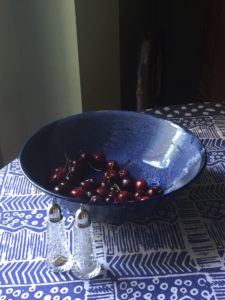
“Despairing for the world,” I spotted her just as she about to get off the 85 bus. In a white, lacy, off-the-shoulder blouse and no-nonsense dark skirt, a black, canvas bag touting the name of whatever tech/Kendall Square conference she was about to attend slung over her bared, coffee-brown shoulder, she exuded confidence. Anticipation. Smarts. “Young, gifted, and black,” indeed. ( Need I add STEM-strong, too?) And, suddenly, because women like her lived in this broken world, too, my grief lifted.
A few weeks later, having just bought “Sam” at a craft fair in Ventura, California, I told my husband and brother-in-law that story. Falteringly I tried to put into words why this figurine so powerfully spoke to me.
“You suddenly saw another version of the future and a world you wanted to live in,” my brother-in-law offered.
Close.
Yes, mysteriously, Sam does somehow invoke that lifting, hope-filled moment on the 85 bus.
She does more, though. Weighted, burdened, as all Women Of Color are, nevertheless Sam persists, she stands, bending but unbowed. Because she’s “under the Power” as Shelly Ann Moore, her creator, put it. And, thus, ironically, her clasped hands remind me of a favorite poem by, yes, an Austro-Hungarian man:
O tell us, poet, what you do. –I praise.
Yes, but the deadly and the monstrous phase,
how do you take it, how resist? –I praise.
But the anonymous, the nameless maze,
how summon it, how call it, poet? –I praise.
What right is yours, in all these varied ways,
under a thousand masks yet true? –I praise.
And why do stillnesss and the roaring blaze,
both star and storm acknowledge you? –because I praise.











